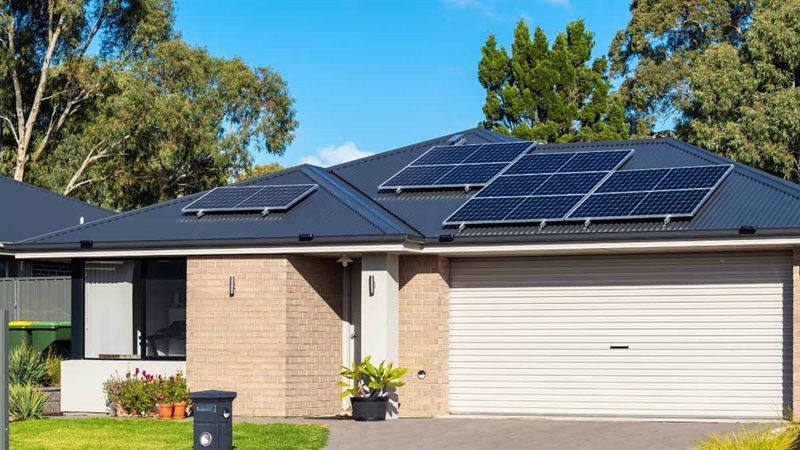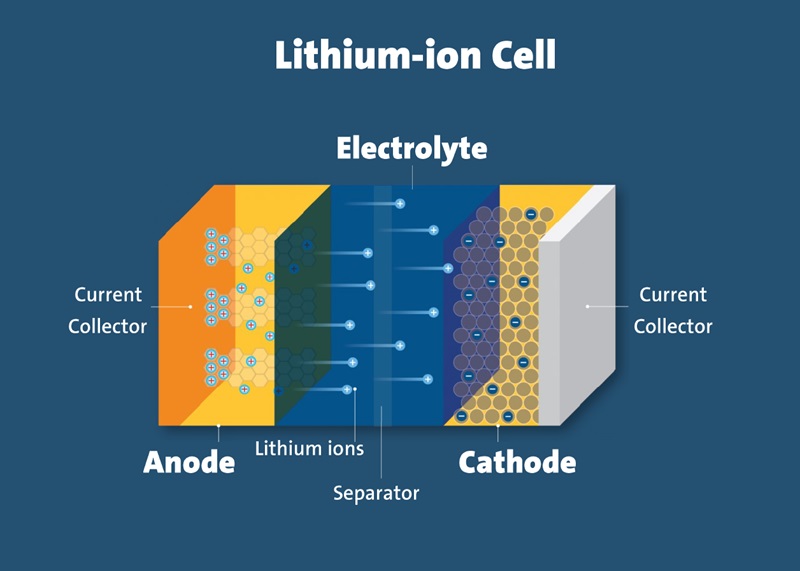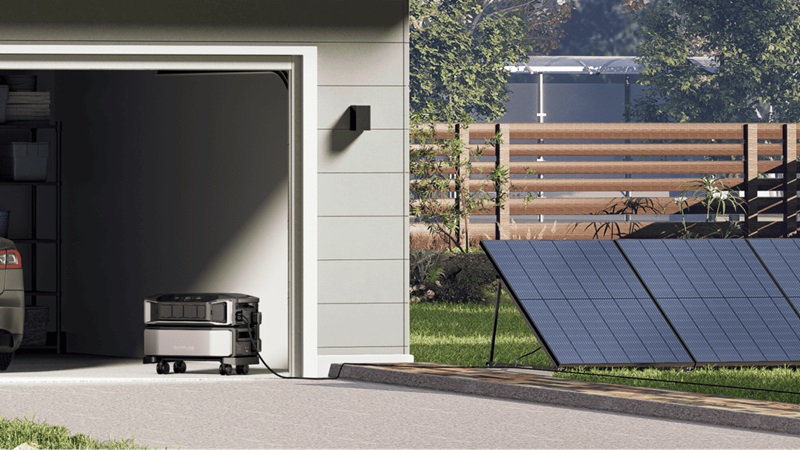Nowadays, the energy demand is increasing and fossil resources are gradually depleted, solar energy storage solutions are essential to ensure the sustainability and stability of the power supply system. Therefore, choosing the best batteries for solar power storage is of interest to many users. Let’s read this article by Alternō for more details!
1. How do solar batteries function?
Any solar power system, especially whole-home backup generators, almost needs solar batteries. PV panels are often mounted on the roof and connected to solar batteries to collect sunlight. Then, DC (Direct Current) is generated from the sunshine. This electricity can be saved for later use or used right away (by converting it to Alternating Current, or AC, electricity using an inverter).
For example, throughout the night or on overcast days, the solar panels will not be able to collect sunlight and you will need to use a backup power source. In this instance, an inverter is used to convert the energy stored into AC electricity. At this time, your household appliances and gadgets can be powered by this AC power, ensuring a steady supply of electricity even in the absence of sunlight.
 Introduction to how solar batteries work
Introduction to how solar batteries work
The future of solar power storage technology is poised for transformative advancements, particularly with the emergence of solid-state and flow batteries, which promise to surpass the limitations of current lithium-ion options. Solid-state batteries, utilizing a solid electrolyte instead of the liquid or gel electrolytes found in traditional lithium-ion batteries, offer enhanced safety, higher energy density, and longer lifespan due to reduced risk of overheating and degradation. They can store more energy in a smaller, lighter package, making them ideal for residential solar systems where space is often limited.
Flow batteries, on the other hand, store energy in liquid electrolytes contained in external tanks, allowing for scalable storage capacity and longer discharge times. This makes them well-suited for larger-scale applications where sustained energy output and long-duration storage are critical. Compared to conventional lithium-ion batteries, both solid-state and flow batteries have the potential to offer greater efficiency, safety, and longevity, addressing some of the key challenges of current technology, and significantly enhancing the effectiveness, and reliability of solar energy systems in the future.
2. What kinds of battery chemistry are there?
Lithium-ion and lithium-iron-phosphate (LFP) batteries are the two most popular kinds of solar batteries. Let’s learn more about these two types of batteries below to find out and choose the best batteries for solar power storage suitable to your needs:
– Lithium-ion:
Since lithium-ion batteries are quite inexpensive and offer a significant amount of energy, they are widely used for solar power storage. This battery is an effective alternative since they have a higher energy storage capacity than lead-acid batteries of the same size.
Maintaining a high state of charge also has little effect on lithium-ion batteries. The low need for upkeep of lithium-ion battery chemistry is also another outstanding feature. You can save time, and money once installed because they require little to no maintenance. Additionally, they are made to be simple to use, which is advantageous if you want to try them on your own even though you are not a technology expert.
You will not need to worry about lithium-ion battery wear and tear because daily cycles of charging and draining lithium-ion batteries can be sustained without causing noticeable deterioration. They are therefore perfect solutions for homeowners searching for a high-efficiency, simple-to-maintain battery.
Lithium-ion batteries are best used for storing solar energy or other renewable energy sources for home use and providing backup power. Therefore, even after many years of regular usage, they will continue to be a dependable source of batteries.

Lithium-ion batteries are one of the most commonly used types of batteries.
– Lithium Iron Phosphate (LFP)
Lithium Iron Phosphate batteries (LFP or LiFePO4) also are gaining popularity quickly on the market because of their lifetime and resilience. They have a deeper discharge capacity than conventional lithium-ion batteries, which allows them to be used to a greater extent before being recharged.
LFP batteries are a safer choice because they can tolerate a large temperature range and have minimal to no chance of thermal runaway. A minor explosive or fire could result from thermal runaway, which is the temperature rising to the point where the battery cell overheats.
The LFP battery is a popular option because of its greater safety, especially for household usage, as this enhanced resistance to this kind of reaction is improved compared to lithium-ion batteries. They work especially effectively in consumption by-oneself mode. If the PV panels aren’t producing enough energy on their own, the battery charges from solar energy and only discharges it when necessary to meet household requirements. The LFP battery often maintains a low charge during the night while in personal consumption mode, which makes it perfect for backup storage.
Lithium Iron Phosphate batteries are best used to support grid stability and integrate renewable energy sources, with an emphasis on safety and longevity. In addition, LFP batteries are also used to store energy generated from solar panels for use at night or during power outages.
3. Advantages and disadvantages of solar batteries
Solar batteries bring many great benefits to users as well as the environment. Below are details of the outstanding pros and cons of solar batteries:
- Advantages:
- Cheaper energy bills: Storing and utilizing your solar energy surplus will help you become less reliant on the grid, which will result in significantly reduced electricity costs.
- Positive impact on the environment: Since solar batteries run on renewable energy, they significantly lower carbon emissions. They don’t generate greenhouse gasses or harmful gasses as other types of generators do.
- Extended lifespan and low maintenance: Reliable electricity can be obtained for many years using high-quality solar batteries. In addition, the majority of solar batteries are easy to maintain and they don’t require frequent cleaning or recharging once installed.
- Reduce grid dependency: By using renewable energy sources such as solar panels, you can reduce your dependence on the grid. You can take advantage of the excess energy stored for maximum use.
- Noiseless: Solar batteries are popular for many families to use since they are silent, in contrast to noisy generators powered by gas, diesel, and propane when you can use them at night without interfering with your restful sleep.
- Able to work alongside grid-tied systems: Grid-tied systems can be connected to solar batteries, increasing your power options and offering a seamless energy solution.
- Disadvantages:
- Exorbitant initial outlay: Solar batteries can have a high upfront cost, but over time, the savings are frequently more than the initial cost.
- Possibly bulky: Some solar panels are quite large so they need a substantial amount of installation space. Although there are smaller models with less wattage and storage, they might not be able to power every equipment in a house.
 Using and storing solar batteries brings significant benefits to users.
Using and storing solar batteries brings significant benefits to users.
4. How to choose the best batteries for solar power storage
Here are the factors you should consider when choosing the best batteries for solar power storage that are right for your home:
- Productivity: The first factor that many people are interested in is productivity. Productivity is the amount of electricity that a solar panel provides at any given time. Kilowatt-hours (kWh) is the unit of measurement used to express the total quantity of electricity that may be stored in a battery-powered by the sun. To prevent overload, total up the kW of all your necessary equipment and make sure this fits the capacity of the solar battery you are thinking about buying.
- Level of discharge: Depth of Discharge (DoD) is how much the capacity of a battery before needing to recharge it, and it varies depending on the kind of battery. A lower DoD could necessitate more regular and prompt recharging, whereas a higher DoD allows you to use more of the energy that is stored before it must be refilled.
- Solar battery storage cost: Another important factor that cannot be overlooked is the purchase cost. Take into account the battery’s initial purchase price as well as any supplementary servicing or installation charges. The cost of solar battery storage depends on many factors, including battery type, storage capacity, and technology used.
- Efficiency of round-trip: A battery with higher round-trip efficiency will save you more energy by reducing losses during the charge/discharge cycle.
- Battery lifespan & warranty: Solar batteries are like cell phone batteries, they have daily “cycles” (charge and discharge). The battery’s lifespan will gradually decrease as you use it with a high frequency of charge/discharge cycles. The average lifespan of a solar battery is usually from 5 to 15 years. To maximize the battery’s lifespan, you need to properly maintain it periodically. In addition, you should protect the battery from extremely hot or cold weather, which also contributes to increasing the battery’s lifespan.
For example, a family decides to install a solar battery system and needs to choose the right battery type for their energy storage needs. The family uses 400 kWh of electricity per month or about 13 kWh per day. They want to choose a battery that can store enough energy for low-sun days or for use at night.
Therefore, they might choose a lithium-ion battery with a storage capacity of 9.8 kWh. With a capacity of 9.8 kWh, you need at least 2 batteries to meet the storage needs of about 20 kWh (2 x 9.8 kWh = 19.6 kWh). You might consider installing another battery to ensure a surplus, for a total of 3 batteries. With a total storage capacity of 19.6 kWh, this system will provide enough energy for about 1.5 days of electricity use (19.6 kWh / 13 kWh/day = 1.5 days).
note
Above is all the information to help you understand how to choose the best batteries for solar power storage, classification, and the advantages and disadvantages of solar batteries. Want expert advice on the best solar battery storage solutions? Contact Alternō today for personalized recommendations!



 Tiếng Việt
Tiếng Việt


